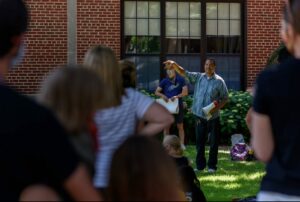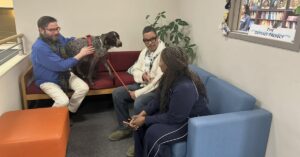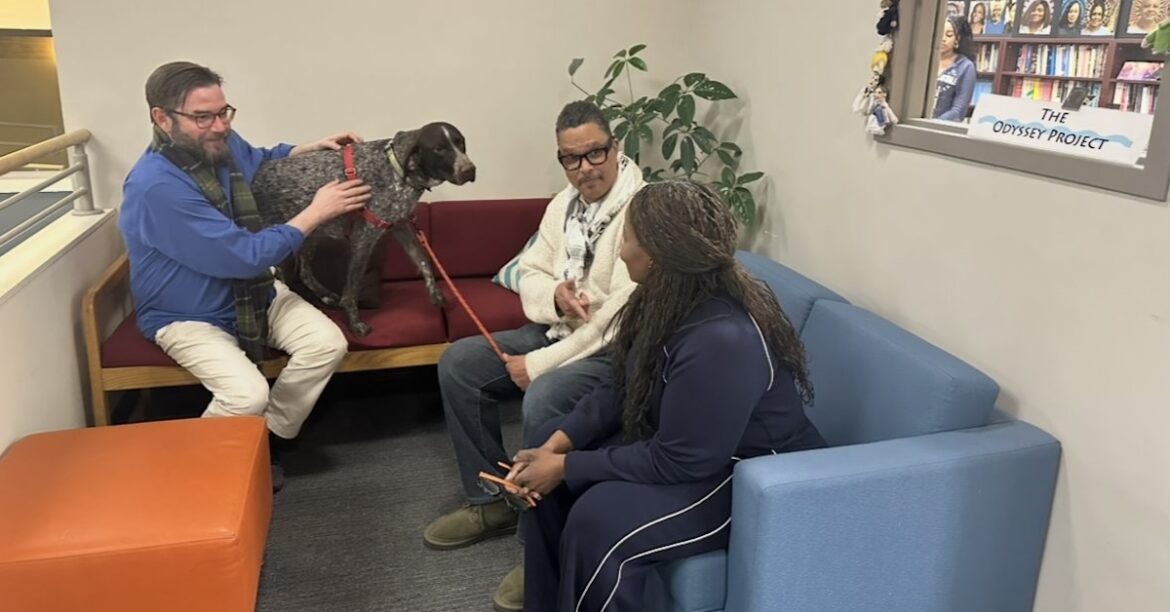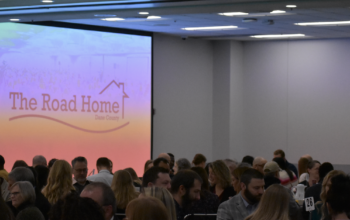This story is part of a two-year (2024-26) series prioritizing solutions to housing insecurity through collaborative storytelling. For more information about the series, please see the project overview. For questions or comments, please contact Sue Robinson at robinson4@wisc.edu.
When Brian Benford was 6 years old, he learned the hard way that not all grandmothers would greet him with warm hugs and fresh cookies.
Marching alongside his St. Boniface classmates in hours-long civil rights protest walks that took them from the north of Milwaukee to its south side, he saw old ladies go red as they screamed slurs and threw projectiles at him, leading their families in brutal attacks against the protestors. Before he saw their angry faces, a young Benford assumed that anyone calling him the N-word considered him a friend.
“To me, it was a term of endearment between Black people, until those protests,” he said.
At 65 years old, such naïveté is long behind Benford. The former social worker and Madison alderperson has dedicated more than half of his life to overcoming obstacles and serving his community. He now works as a success coach for UW Odyssey Project, helping low-income adults and families access an education.
“The number one gift of Odyssey is that regardless of whether or not you have a degree, you can be a lifelong learner,” Benford said.
Benford’s backstory
Benford’s hopes for his own education slipped from his grasp in the ’70s, after rioting in Milwaukee forced his family to move to Fort Atkinson, Wisconsin.
“I remember having a guidance counselor tell me, ‘You should join the Marines!’” Benford said. “When I told him I didn’t want to, he just went, ‘Well, college is out of the question for you.’”
Benford had been held back for a year in third grade without testing because his teachers didn’t believe a Black child from Milwaukee could read. In high school, an English teacher gave him D grades on every paper he turned in for class, even after Benford confronted her when his friend handed in one of his papers under their name and received an A.
“It was all just unrelenting, messing me up to a point where I was in a bad place psychologically, socially and eventually academically,” he said. Benford would later turn to “drinking and drugging” during high school, and he dropped out of college his freshman year.
Madison social justice involvement
Benford said he was “blind to poverty” in Madison when he first arrived at the age of 18 to work at Ovens of Brittany. He thought of the city as “all Birkenstocks and patchouli” until 1992, when he took a job as a cook for local out-of-school youth job training nonprofit Operation Fresh Start.
“I realized that Madison was a tale of two cities,” Benford said. “I mean, I knew what poverty was: I had holes in my arm from donating plasma. But it became clear to me there that serving vulnerable people was what I was supposed to be doing.”

From there, Benford dedicated himself to community service. He was inspired to become an alderperson a decade later while working as an after school program leader at O’Keeffe Middle School, when one of his students, Rosalinda “Rosita” Solis, was hit by a car and killed the night before her eighth grade graduation.
“I called the alderperson at the time and I remember fighting back tears, saying, ‘We got to do something to make East Washington safer, I just lost a student,’ and her being so flippant,” Benford said. “Just couldn’t care less, wouldn’t do anything about it.”
Solis’ death spurred Benford to action. He went door to door with students, teachers and friends as an alderperson candidate for then-District 12 and won despite being “massively outfunded.”
“I’ll never forget election night, heading to my victory party and just sobbing,” Benford said. “I could not stop crying, thinking about how my ancestors sacrificed before this.”
Finding Odyssey and dreaming of more
Benford eventually joined Odyssey in 2007 as a student at the urging of former UW–Madison dean Mary Rouse. He received his bachelor’s and master’s degrees of social work in 2016 and 2020 respectively, despite nearly dying from prostate cancer in 2011.
“When I was back on my feet, Odyssey people were the voices that pushed me to finish, told me I wasn’t done yet,” he said.
Benford has dedicated his life to the Odyssey since then. For the future, he dreams of building a city “community collaborative program” of health care, child care, food assistance, a shared closet of clothes for job interviewing and, most importantly, affordable housing.
“If you don’t have safe, secure housing, you can’t heal from substance abuse, can’t heal from domestic violence. You can’t even begin to think about school,” Benford said.
In February, Benford visited Scholar Houses — programs providing affordable housing to single moms who are enrolled in school — in Indiana and Kentucky. He said he “believes in [his] heart” that Madison could have its own Family Scholar House for students one day. (To learn more about the program, please see the documentary exploring the Scholar House concept produced by UW–Madison student reporters Sreejita Patra and Kiesen Williams.)
“I joke that once we break ground and get the building going, Duke and I will be the first house fellas,” Benford said, scratching the Odyssey therapy dog behind its ear. “I tell my students we’ll live in the building, and that I’ll plant the most beautiful garden out front.”






